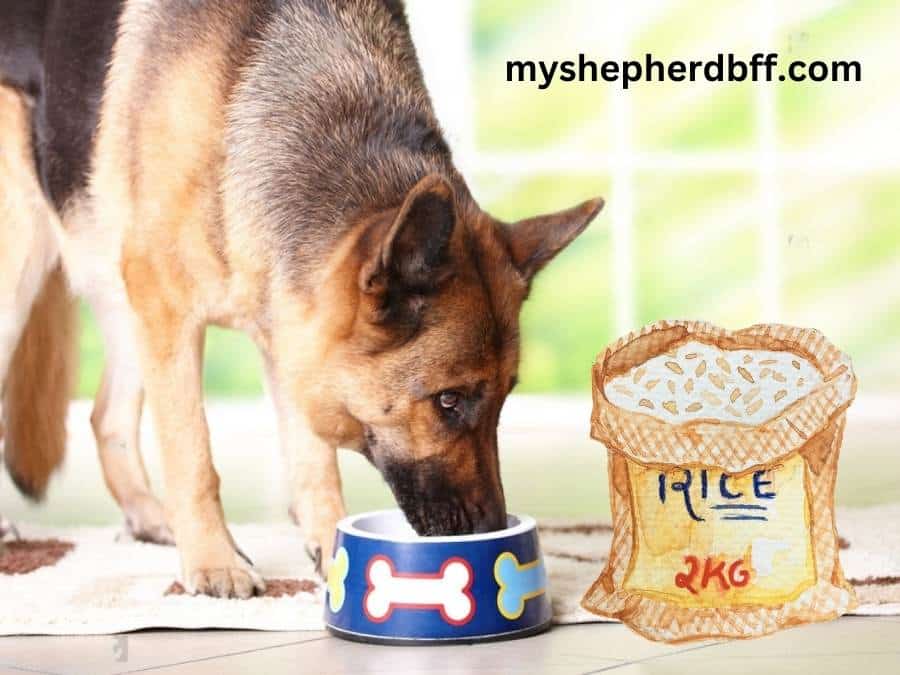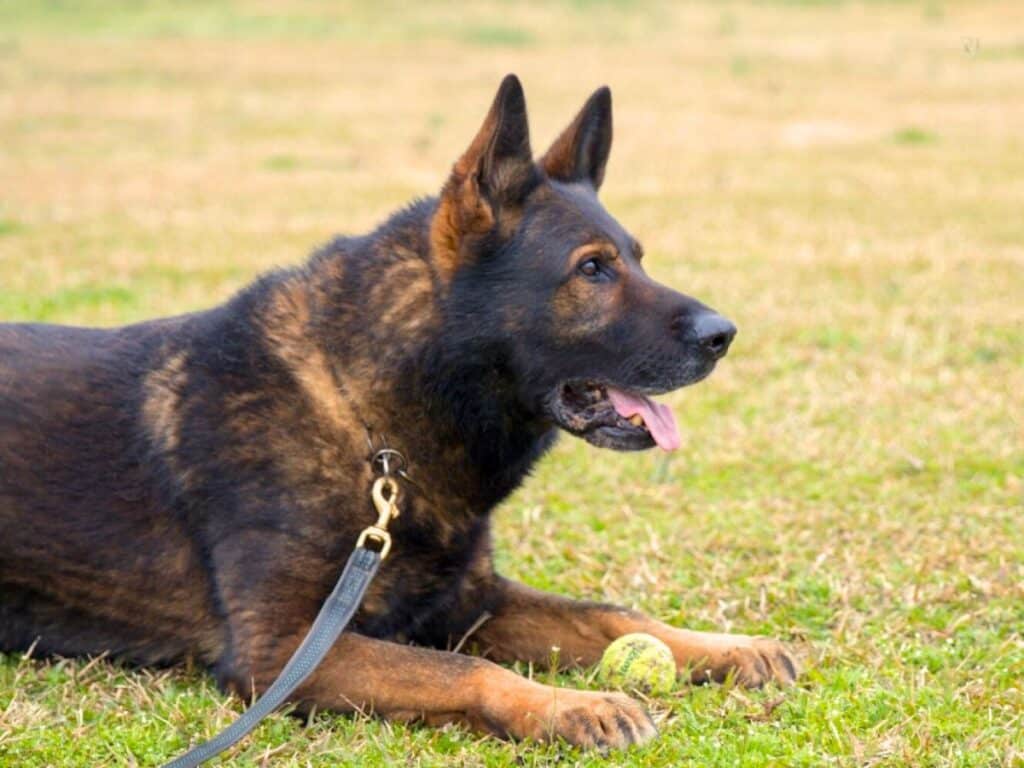If you’re wondering “Can German Shepherds eat rice?” Well, you’re not alone! Many pet owners like yourself have pondered whether this popular human food can be shared with their canine companions.
The answer might surprise you! While some foods are off-limits for dogs due to potential health hazards, others can provide valuable nutrients that contribute to their well-being. As we delve deeper into the world of canine nutrition, we’ll discover if rice aligns with the dietary needs of German Shepherds.
Can I Feed Rice To My German Shepherd?
Yes, German Shepherds can eat rice. In fact, rice can be a healthy addition to their diet. Rice is a good source of carbohydrates and can provide energy for your German Shepherd. It is also easily digestible, which makes it a suitable option for dogs with sensitive stomachs.
When feeding rice to your German Shepherd, it is important to cook it thoroughly and avoid adding any spices, seasonings, or oils. Plain, cooked rice is the best option for your German Shepherd.
Rice can be mixed with other ingredients such as cooked meat or vegetables to provide a balanced meal for your dog.
Just make sure to introduce it gradually into their diet and monitor their response to ensure they tolerate it well. As always, it is a good idea to consult with your veterinarian before making any significant changes to your dog’s diet.
Nutritional Value of Rice for German Shepherds

Rice can provide GSDs with the necessary carbohydrates and nutrients to keep up with their energetic lifestyle. Let’s take a closer look at the nutritional value of rice for German Shepherds.
1. Rice is a great source of carbohydrates
Carbohydrates are essential for providing energy to active dogs like German Shepherds. The complex carbohydrates in rice are slowly digested, resulting in a steady release of energy throughout the day.
This can help German Shepherds maintain their energy levels and support their active lifestyle.
2. Rice can be easily digested by dogs
Rice is easily digestible for dogs, making it a gentle option for those with sensitive stomachs. It can be particularly beneficial for German Shepherds that have digestive issues or food allergies. The bland nature of rice can help soothe their stomach and alleviate any discomfort.
3. Rice is low-fat
Furthermore, rice is low in fat and cholesterol, making it a healthy choice for German Shepherds. It can help them maintain a healthy weight and prevent obesity, which is important for their overall well-being.
4. Gluten-free option
Rice is naturally gluten-free, making it a suitable choice for German Shepherds with gluten sensitivities or allergies.
5. Rice has low allergenic potential
Compared to other grains, rice has a lower likelihood of causing allergies or food sensitivities in dogs. It is often recommended as a hypoallergenic ingredient in specialized dog diets.
RELATED: German Shepherd Allergies & Treatments
6. Source of nutrients
While rice itself is not nutritionally dense, it can serve as a base for a balanced meal when combined with other ingredients. By adding lean meats, vegetables, or supplements, you can create a nutritious meal that provides essential nutrients for your dog.
RELATED: What Do German Shepherds Eat?
Essential Vitamins and Minerals in Rice

In addition to its carbohydrate content, rice also contains essential vitamins and minerals that contribute to a balanced diet for your German Shepherd. These nutrients play crucial roles in your dog’s overall health and well-being.
Some key vitamins found in rice include:
- Vitamin B1 (Thiamine): Plays a vital role in energy metabolism and helps support proper nerve function.
- Vitamin B3 (Niacin): Aids in digestion, promotes healthy skin, and contributes to the overall functioning of the nervous system.
- Vitamin B6: Important for brain development and function, as well as maintaining a healthy immune system.
- Folate: Essential for cell growth and reproduction.
Minerals present in rice include:
- Magnesium: Important for muscle function, nerve transmission, and maintaining strong bones.
- Phosphorus: Essential for bone formation, kidney function, and cell growth.
- Zinc: Supports immune function, wound healing, and normal growth.
It’s worth noting that while rice can provide some vitamins and minerals, it is not a complete source of nutrition on its own. It should be combined with other ingredients such as lean meats, vegetables, and possibly additional supplements to ensure your German Shepherd receives a well-rounded and balanced diet.
While rice can be a valuable addition to your German Shepherd’s diet, it’s important to feed it in moderation. Too much rice can lead to an imbalance in your dog’s overall nutrition.
As with any dietary changes or additions, it’s always best to consult with your veterinarian before making significant adjustments to your German Shepherd’s diet.
RELATED: What Fruits Can German Shepherds Eat
Risks of Excessive Rice Consumption for German Shepherds

While rice can be a part of a balanced diet for GSDs, excessive consumption can pose certain risks. Here are some potential risks associated with excessive rice consumption:
1. Weight Gain and Obesity
Rice is a carbohydrate-rich food that, when consumed in excess, can contribute to weight gain and obesity in dogs. Just like humans, dogs need to maintain a healthy weight to prevent various health issues such as joint problems, heart disease, and diabetes.
When feeding your German Shepherd rice, it’s essential to consider portion sizes and ensure they are getting the right balance of nutrients.
2. Digestive Issues
While rice is generally considered safe for dogs, overfeeding can result in digestive issues such as bloating or diarrhea. German Shepherds have sensitive stomachs just like any other breed, so it’s important not to go overboard with the rice portion sizes.
Excessive water absorption by rice during cooking may cause bloating in some dogs due to increased gas production. This can lead to discomfort and even pain for your furry companion.
A sudden increase in fiber intake from consuming too much rice can result in loose stools or diarrhea.
To prevent these digestive issues, make sure you introduce rice gradually into your dog’s diet and closely monitor their response.
3. Nutritional Imbalance
While rice can be a part of a healthy canine diet when fed in moderation, relying solely on this grain as the main source of nutrition can lead to nutrient deficiencies. Dogs require a well-rounded diet that includes proteins, healthy fats, vitamins, and minerals to thrive.
If your German Shepherd consumes excessive amounts of rice without a balanced intake of other essential nutrients, they may suffer from deficiencies that can negatively impact their overall health.
It’s crucial to provide them with a variety of foods that meet their nutritional needs while incorporating rice as just one component of their diet.
4. Allergies and Sensitivities
While most dogs tolerate rice well, it’s important to be aware of potential allergies or sensitivities your German Shepherd may have towards grains like rice. Food allergies in dogs can manifest as skin irritations, itching, gastrointestinal issues, or even respiratory problems.
If you suspect your dog may be allergic or sensitive to rice or any other grain, it’s recommended to consult with your veterinarian for proper diagnosis and guidance.
RELATED:
Can I Feed My German Shepherd Brown Rice?

Yes, you can feed your German Shepherd brown rice. Brown rice is a whole grain and is considered a healthier option compared to white rice because it retains more of its natural nutrients and fiber.
The fiber content in brown rice can aid in digestion and promote bowel regularity in dogs. Additionally, brown rice contains essential nutrients such as vitamins, minerals, and antioxidants.
When feeding brown rice to your German Shepherd, it’s important to cook it thoroughly to make it easier to digest. Ensure that the brown rice is plain and not seasoned with any spices, oils, or additives that may be harmful to your dog.
While brown rice can be a part of your German Shepherd’s diet, it should still be balanced with other protein sources, vegetables, and necessary nutrients.
Brown Rice vs White Rice
1. Brown rice offers more nutritional value to your dog
Brown rice offers more fiber, vitamins, and minerals compared to white rice, making it a healthier choice for your doggy.
Unlike its refined counterpart, brown rice undergoes minimal processing, retaining its bran and germ layers. These layers are rich in fiber, vitamins (such as B-complex vitamins), and minerals (like magnesium and phosphorus).
By incorporating brown rice into your dog’s diet, you ensure they receive these essential nutrients that contribute to overall health.
The added fiber content in brown rice aids in digestion by promoting regular bowel movements. This can help prevent constipation or other gastrointestinal issues that may affect your dog’s well-being.
2. Brown rice keeps blood sugar levels regulated
Its lower glycemic index helps regulate blood sugar levels and provides a steady release of energy.
The glycemic index (GI) measures how quickly carbohydrates from food raise blood sugar levels. Foods with a high GI cause rapid spikes followed by crashes in blood sugar levels.
On the other hand, foods with a low GI release glucose slowly into the bloodstream, providing sustained energy over time.
It can be particularly beneficial for dogs with diabetes or those prone to weight gain, as it helps regulate blood sugar levels and prevents sudden energy crashes.
3. Brown rice helps in digestion
Brown rice can aid in digestion due to its higher fiber content, promoting a healthy gastrointestinal system for your German Shepherd.
A healthy digestive system is crucial for your German Shepherd’s overall well-being. The fiber present in brown rice helps maintain regular bowel movements and prevents constipation.
Moreover, the fiber in brown rice can also support the growth of beneficial gut bacteria. These bacteria play a vital role in maintaining a balanced gut microbiome, which is essential for proper digestion and nutrient absorption.
Using Rice to Soothe Upset Stomachs in German Shepherds

Rice is known for its mild nature, which makes it an excellent choice for soothing the digestive system. When dogs have upset stomachs, their digestive tract becomes sensitive and inflamed.
Feeding them regular food during this time can exacerbate the issue and prolong their discomfort. However, boiled rice is easily digestible and does not add any additional stress to their already troubled stomachs.
By feeding your dog boiled rice, you are providing them with a simple yet nutritious option that won’t burden their digestive system. This allows their body to focus on recovering from whatever caused the upset stomach in the first place.
To make the rice more enticing for your furry friend, consider mixing it with boiled chicken or broth. The added flavor and aroma will enhance palatability and encourage eating even when they might not have much appetite due to their upset stomach.
How much rice should I feed my German Shepherd?

A general guideline is to allocate around 10-15% of your German Shepherd’s daily caloric intake from carbohydrates like rice.
This percentage ensures that they receive enough energy while still maintaining a well-rounded diet. For example, if your dog requires 2000 calories per day, you should aim for approximately 200-300 calories from rice.
Monitoring your dog’s body condition is essential in adjusting portion sizes accordingly. If you notice that your German Shepherd is gaining weight or becoming overweight, it may be necessary to reduce the amount of rice in their meals.
On the other hand, if they are losing weight or appear undernourished, increasing their rice intake might be beneficial.
Consulting with a veterinarian or canine nutritionist can provide personalized recommendations for proper portioning based on your specific German Shepherd’s needs.
How many times can I feed rice to my German Shepherd?

While rice can be a healthy addition to their diet, it’s important to find the right balance that suits your furry friend’s specific requirements.
Individual Dietary Needs and Preferences
As an owner, you have the flexibility to decide how frequently you want to include rice in your German Shepherd’s meals. Some owners choose to offer small amounts of rice in every meal as a source of carbohydrates and fiber. This can help provide energy and aid in digestion.
On the other hand, some owners prefer to offer rice as an occasional treat or supplement alongside their regular meals. This approach allows for variety in their overall diet without relying solely on rice as a primary food source.
Factors to Consider
When deciding how often you should feed rice to your German Shepherd, several factors come into play:
- Weight Management Goals: If your dog is overweight or prone to weight gain, incorporating too much rice into their diet may not be ideal. Rice is relatively high in carbohydrates and calories, so it’s crucial to consider portion sizes and overall calorie intake when managing weight.
- Activity Levels: The amount of exercise your German Shepherd gets also plays a role in determining how often they should consume rice. Dogs with higher activity levels may require more carbohydrates for sustained energy throughout the day.
- Underlying Health Conditions: If your German Shepherd has any underlying health conditions such as diabetes or food allergies, it’s important to consult with your veterinarian before introducing rice into their diet. They can provide guidance on the appropriate frequency and portion sizes based on your dog’s specific needs.
What other foods can I mix rice with?

It’s important to provide dogs with a variety of foods to ensure they receive balanced nutrition. One way to achieve this is by mixing rice with other ingredients, creating a flavorful and nutritious meal that your furry friend will love.
1. Adding Lean Proteins for Muscle Development and Repair
Including lean proteins alongside cooked rice can offer additional amino acids that are essential for muscle development and repair in German Shepherds. Consider adding fish or eggs as protein sources to their meals.
Fish, such as salmon or tuna, provides omega-3 fatty acids that promote healthy skin and coat. Eggs are packed with high-quality protein and contain essential vitamins like vitamin B12.
2. Incorporating Vegetables for Added Nutrition
To further enhance the nutritional value of your German Shepherd’s meal, consider incorporating vegetables into their diet alongside rice. Vegetables like spinach or sweet potatoes are excellent choices as they provide vitamins, minerals, and fiber.
Spinach is rich in iron, which helps support healthy blood circulation. It also contains antioxidants that contribute to overall immune system health. Sweet potatoes are a great source of dietary fiber and contain beneficial antioxidants like beta-carotene.
3. Enhancing Nutritional Profile with Dog Food
While mixing rice with various ingredients provides dietary variation, it is still crucial to ensure that your German Shepherd receives all the necessary nutrients. This can be achieved by incorporating a small amount of high-quality dog food into their meals.
Choose a dog food brand that offers complete and balanced nutrition specifically formulated for German Shepherds. By combining a small portion of dog food with rice and other ingredients, you can enhance the overall nutritional profile of the meal.
When introducing new ingredients to your German Shepherd’s diet, it is important to do so gradually. This allows you to monitor any adverse reactions or sensitivities that your furry friend may have.
Conclusion
In conclusion, rice can be a beneficial addition to a German Shepherd’s diet when fed in moderation and prepared properly. It offers nutritional value, aids in soothing upset stomachs, and provides dietary variation.
However, while rice can be a valuable addition to a German Shepherd’s diet when used appropriately, it should not replace a well-balanced canine food regimen. Always consult with your veterinarian before making any significant changes to your dog’s diet.
Frequently Asked Questions (FAQs)
1. Can I feed my German Shepherd raw rice?
No, it is not recommended to feed raw rice to your German Shepherd. Raw grains are difficult for dogs to digest and may cause gastrointestinal issues. Ensure that the rice is thoroughly cooked before feeding it to your dog.
2. How much rice should I feed my German Shepherd?
The amount of rice to feed your German Shepherd depends on factors such as their size, age, and activity level. It is best to consult with your veterinarian to determine the appropriate portion size for your dog.
3. Can I feed my German Shepherd rice every day?
Feeding rice to your German Shepherd every day may not be necessary or ideal. While it can be included in their diet occasionally, a well-balanced canine food regimen should provide all the necessary nutrients. Consult with your veterinarian for guidance on the frequency of rice feeding.
4. Are there any other human foods that are safe for my German Shepherd?
Yes, there are several human foods that can be safely incorporated into a German Shepherd’s diet. Some examples include lean meats like chicken or turkey (without seasoning), fruits like apples or blueberries (in moderation), and vegetables like carrots or green beans (cooked and unseasoned). Always introduce new foods gradually and monitor your dog’s reaction.
5. Is it okay to mix rice with other dog food?
Yes, mixing rice with other dog food can provide dietary variation and add texture to meals. However, ensure that the other ingredients are suitable for dogs and do not contain any harmful additives or seasonings. Gradually introduce new food combinations to avoid digestive upset.
6. Can feeding rice help with my German Shepherd’s weight management?
Rice alone may not be sufficient for weight management in German Shepherds. It is essential to maintain a balanced diet that includes appropriate portions of protein, carbohydrates, and fats. Consult with your veterinarian for personalized advice regarding weight management strategies for your dog.




